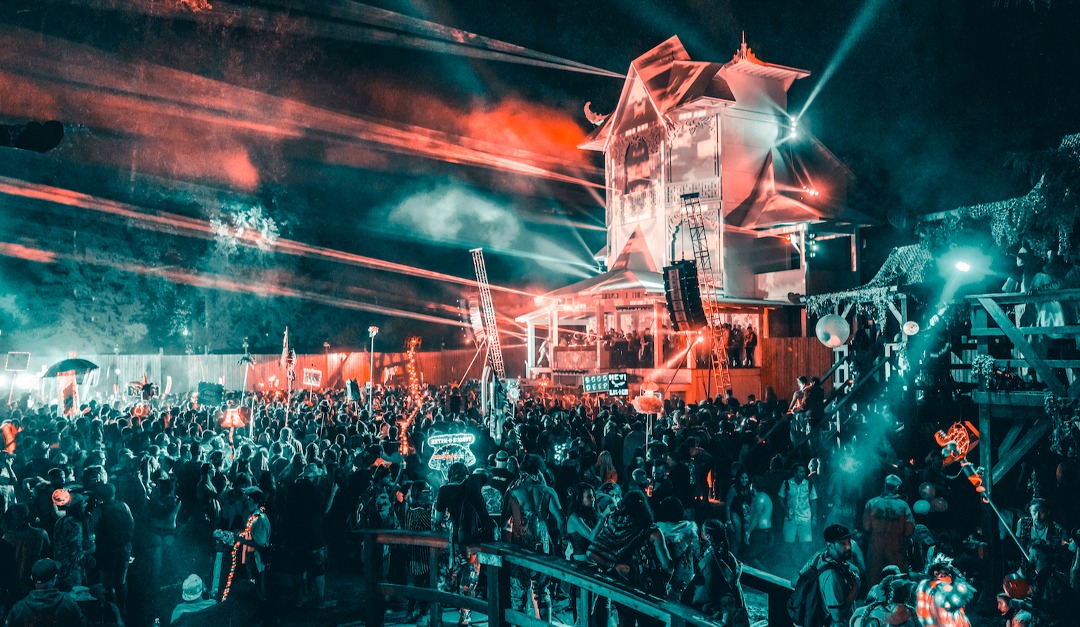by Stacey McLachlan. Originally published in the Fall 2021 edition of Business Class magazine. Photo credit: Divisuals, courtesy of Shambhala Music Festival
Becoming the CEO of one of BC’s biggest musical festivals right before a major pandemic would send most people running for the hills. But really, uncertainty is always built into event production—so in a way, Neil MacLeod, MBA ’21, the new CEO of Shambhala, has been training for this chaotic time over the course of his eight years with the company.
From the threat of wildfires to weather or mercurial guests, live shows are subject to a smorgasbord of threats, even during the best of times. And, while he’s been adapting and pivoting ever since he started with the company in 2013, today, MacLeod’s MBA allows him to roll with the punches in a new way, as his business savvy brings a layer of stability into an oft-unstable industry. “You get criticized: ‘oh, you’re too much of a business.’ But if it’s not run like a business, it won’t be around for long,” says MacLeod. “The industry needs more business-like people. You find a lot of individuals who go to business school and wind up working with an organization like banking or insurance. But that’s often a missed opportunity for the arts.” It’s not about making massive profits, necessarily, says MacLeod: it’s about sustainability and survival, enabling the event to come back again next year.
It’s still up in the air if the next Shambhala will feature its usual six stages and 18,000 participants, but MacLeod and his team are hoping for the best, particularly because of the community impact the annual event has. Just before the pandemic, MacLeod initiated an economic assessment—and even he was shocked by the results. “We were within the top 12 events in the province,” he says. “The number of jobs the event supports is massive, and 75 per cent of the audience comes from outside BC.” Having these hard numbers on hand during the COVID-19 pandemic was a lifesaver, as it allowed the organization to win some grants and financial support to weather the storm. But the impressive stats were also a powerful reminder about the economic impact of the arts.While Shambhala may look like a feel-good dance party, it’s also a highly successful company. (Shambhala’s scheduled 2022 festival will be its 23rd). Over the years, producers of the event have developed vertical integrations to maximize efficiencies and streamline cost; for example, they started their own security company after years of struggling to get reliable help, and run Nelson’s Savoy Hotel to accommodate travelling artists and volunteers.
MacLeod, back in 2012, was one of those volunteers. He, his partner and his kids arrived in Canada that summer looking for a change of pace from their life in the suburbs of Edinburgh. With no destination in mind, they started their great Canadian adventure by visiting a friend in Nelson—a friend who just so happened to be doing some engineering work for Shambhala. Though MacLeod’s background was in banking and finance, he agreed to do some construction work in exchange for some free tickets…and quickly found himself with a broken hand. “The owner felt pretty bad and asked if there was anything else I’d like to do,” recalls MacLeod. “They happened to need someone to work in payroll.” MacLeod quickly found himself reviewing expenses, helping with HR issues and soon, taking over as head of finance. Over the next few years, he got a crash course in Shambhala’s operation, going wherever work was needed. “I got to understand the business from every perspective,” he says. “I wasn’t looking for a career, but it was so enjoyable.”
It was that sudden pivot to a career as a festival organizer that convinced MacLeod to start his MBA, and the pandemic suddenly proved to be a perfect opportunity. “As I was starting to spend more time in an executive position, I just felt I needed that additional education,” says MacLeod. “When you’re actually working, you do get a lot of experience, but you don’t always get that ability to learn from others around you.” UVic’s MBA ended up being a natural fit. Shambhala already did as much as possible to keep things green and minimize impact but exploring sustainability on a bigger-picture level had a lot of appeal for MacLeod.
He likens the event industry to being a farmer: “There’s so much logistics and planning, but then you actually get to enjoy the fruits of your labour, and see the impact of your efforts on the customer,” he says. “Yes, there are some long days once the festival gets underway, but those moments of taking a beat and soaking up the event itself, watching the joy on your guests’ faces: it’s something special.” He recalls a night from the early years, finally looking up from a busy day running the smoothie bar: “It was 10 p.m. The lights were going, the music was playing, everyone was dressed up. It was the moment where everything was coming alive, and I fell in love with the industry at that moment.”
With moments like these put on pause over the course of the pandemic, MacLeod is even more convinced of the value of the arts. “Movies, a nightclub, theatre…It doesn’t matter what you have in your life, those things have been gone for the last 12 months, and we’ve seen high rates of anxiety and depression. There’s a lack of connection. I believe the arts and culture are the key parts to what’s missing right now,” he says. Seeing the joy on people’s faces as in-person events return has only proved his hypothesis. “You take away the arts, and what are you left with in society?”


